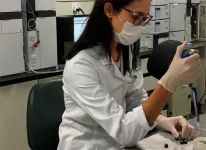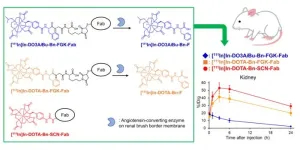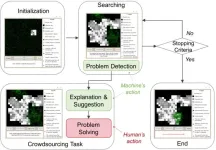(Press-News.org) PITTSBURGH – To reimagine existing preclinical trials for Alzheimer’s disease, University of Pittsburgh School of Medicine neuroscientists created the first non-human primate model of hereditary Alzheimer's in marmoset monkeys, outlining their approach in Alzheimer's & Dementia: Translational Research & Clinical Interventions.
Researchers are now working on characterizing and validating genetic, molecular, functional and cognitive features of aging and Alzheimer’s disease in marmosets that harbor mutations in the same gene that is linked to early-onset disease in humans. Scientists hope to accelerate the pace of the drug discovery pipeline and rebuild the foundation for future translational studies while overcoming limitations inherent to existing preclinical models.
“We are ambitious about finding a cure for Alzheimer’s disease,” said senior author Afonso Silva, Ph.D., professor of neurobiology at Pitt. “We are establishing a process for rigorous, minimally invasive standardized testing of the marmoset model of Alzheimer’s disease and openly sharing data.”
Marmoset families are better matched to mimic the genetically diverse human population than a colony of inbred rodents. And because marmosets’ life spans are shorter than those of other non-human primates, researchers can comprehensively study their aging within a relatively short period of time.
If allowed to age naturally, marmosets will spontaneously develop aggregates of toxic amyloid beta and tau indicative of Alzheimer’s-like pathology in the brain. To create marmosets with inheritable predisposition to Alzheimer’s disease, researchers introduced a series of mutations in the PSEN1 gene using the Crispr/Cas9 gene engineering system. These same mutations cause early onset Alzheimer’s disease in humans.
Presenilin-1, the protein encoded by PSEN1, plays a key role in generating amyloid tangles, and, just like human patients, marmosets with a mutation in the PSEN1 gene start developing Alzheimer’s-like pathologies during adolescence.
In establishing the model, the team is applying a bench-to-bedside approach to marmosets as though they were human patients. To characterize and validate the new model, researchers are employing a battery of non-invasive tests, including behavioral studies, longitudinal analysis of blood biomarkers, and regular PET scans to assess brain function and pathological changes in the brain tissue. The tests are designed to map out and compare the aging trajectory between healthy controls and animals genetically predisposed to early-onset Alzheimer’s and correlate progressive changes in the levels of amyloid and tau to changes in cognition.
Researchers also plan to look into other factors that accompany disease progression, including brain-blood barrier permeability, vascular stiffness and metabolism, as well as analyze changes in gene expression profiles over time by regularly sampling skin cells.
“We need new models to understand underlying biological processes behind normal and pathological aging,” said lead and corresponding author Stacey Rizzo, Ph.D., associate professor of neurobiology and deputy director for preclinical research at Pitt’s Aging Institute. “Tracking the animals from birth in a well-controlled way would allow us to hypothesize on how molecular and genetic changes translate to pathophysiological consequences in the brain and devise ways to stop them from getting to the point of no return.”
In 2022, Rizzo and Silva received a five-year, $32.5 million grant from the National Institutes of Health to conduct this project.
Additional authors of the study are Gregg Homanics, Ph.D., David Schaeffer, Ph.D., Lauren Schaeffer, M.S., Jung Eun Park, M.S., Ph.D., Julia Oluoch, Tingting Zhang, Ph.D., Takeshi Murai, Ph.D., Sang Ho Choi, Ph.D., Hasi Huhe, Ph.D., Julia Kofler, M.D., and Peter Strick, Ph.D., all of Pitt, as well as collaborators from The Jackson Laboratory, Emory University, University of California Santa Cruz and Sage Bionetworks.
This work is supported by the National Institutes of Health, National Institute on Aging (grant U19AG074866) and UPMC-ITTC IPA 2019 NO.16 grant. Support from DSF Charitable Foundation Grant 1805R01 provided resources to enable this research.
END
Pitt researchers to study Alzheimer’s disease in marmosets
2023-09-06
ELSE PRESS RELEASES FROM THIS DATE:
Oral health deteriorates before and after bariatric surgery, study shows
2023-09-06
Oral health deteriorates in morbidly obese people on a diet in preparation for bariatric surgery and patients who have undergone the procedure, with increasing caries, gingivitis and periodontitis. This is the conclusion of a study conducted by researchers at the Federal University of São Paulo (UNIFESP) in Brazil. Articles on the study are published in the Journal of Oral Rehabilitation and Clinical Oral Investigations, stressing the importance of participation by a dentist in the assessment of bariatric patients.
The study was funded by FAPESP (projects 17/26400-6 and 16/10940-9), following 100 patients divided into two groups (dietary ...
Patients with AML who received vitamin C/D supplements had fewer complications, but no overall survival benefit seen
2023-09-06
Patients with acute myeloid leukemia (AML) who received vitamin C and D supplements while undergoing intensive chemotherapy had lower rates of complications, such as infections, bleeding, and inflammation, when compared with similar, previously treated patients who did not receive these supplements. Moreover, while the study showed no difference in survival between the two groups, a subgroup analysis showed that among patients with a genetic mutation known as NPM1 – found in about one in three patients with AML – the risk of death was nearly 50% lower among those ...
University of Colorado ophthalmologists administer novel treatment for single patient facing rare genetic condition
2023-09-06
Thirteen-year-old Grace Hoyt received potentially the best birthday gift ever this month when pediatric ophthalmologists at the University of Colorado School of Medicine and Children’s Hospital Colorado administered the first treatment designed specifically to slow her vision loss associated with posterior column ataxia with retinitis pigmentosa (PCARP), a rare genetic condition that affects vision and the nervous system.
“It’s so incredible that she has this opportunity,” Susan Hoyt says of her daughter, who received the first treatment Aug. 24. “We’ve known that Grace is going to go blind, but to have ...
Novel molecular design for enhanced efficacy and safety in radiotheranostics
2023-09-06
Radiotheranostics embodies the convergence of diagnostic and therapeutic radiopharmaceuticals into a unified platform. In cancer treatment, radiotheranostic procedures typically involve the use of antibodies that bind to proteins abundantly found on the surface of cancerous cells. The antibodies are labeled with a suitable radioisotope, which facilitates imaging procedures used to diagnose cancer and can be used to target cancerous cells and bombard them with deadly radiation as a form of treatment.
Although radiolabeled antibodies show promise as a treatment for cancer, several hurdles impede their clinical translation. ...
Potential target for reversing drug resistance in ovarian cancer identified
2023-09-06
For the 314,000 people diagnosed with ovarian cancer each year, hope often comes in the form of platinum-based drugs such as cisplatin.
Cisplatin causes the death of quick-dividing tumour cells, so it is a potent first-line defence in the treatment of the often fatal disease.
However, over half of ovarian cancer patients develop recurrence and become resistant to cisplatin and other platinum-based chemotherapies, contributing to the five-year survival rate of 31%.
It is unclear why this resistance occurs, but a solution is urgently ...
Human-AI collaboration improves source search outcomes
2023-09-06
When artificial intelligence robots that have been designed to use algorithms to complete source search tasks, such as search and rescue operations during a fire, encounter a disturbance, they are often unable to complete their task. Proposed solutions have ranged from trying to improve algorithms to introducing additional robots, but these AI-driven robots still encounter fatal problems.
Researchers have proposed a solution: a human-AI collaboration that takes advantages of the unique skills of the human brain to overcome challenges.
The paper was published in the Journal of Social ...
Teleneurology challenges met by training curriculum
2023-09-06
A new physician-training system in telehealth simulates key parts of traditional, in-person neurological exams that use little reflex hammers, pinpricks, and flashlights to test nerve function. The three-year program, which was designed by researchers at NYU Grossman School of Medicine, has trained at least 68 neurology residents since its rollout in 2020. Published online Aug. 3 in Neurology Education, a new analysis of the curriculum identifies challenges to translating in-person exam techniques ...
A secret for boosting hotel bookings: analyze online user reviews for your hotel and your competitors
2023-09-06
Researchers from Texas Christian University, University of South Carolina, and RealPage published a new Journal of Marketing article that examines the impact of online reviews on hotel booking performance with a specific focus on the competitive effects of reviews.
The study, forthcoming in the Journal of Marketing, is titled “The Competitive Effects of Online Reviews on Hotel Demand” and is authored by Sanghoon Cho, Pelin Pekgun, Ramkumar Janakiraman, and Jian Wang.
Recent reports indicate that a majority of consumers trust online reviews as much as personal recommendations when deciding to book a hotel. A 2019 study ...
Rubber plumbing seals can leak additives into drinking water, study says
2023-09-06
As drinking water flows through pipes and into a glass, it runs against the rubber seals inside some plumbing devices. These parts contain additives that contribute to their flexibility and durability, but these potentially harmful compounds can leak into drinking water, according to a small-scale study in ACS’ Environmental Science & Technology Letters. The authors report that the released compounds, which are typically linked to tire pollution, also transformed into other unwanted byproducts.
To enhance rubber’s strength and durability, manufacturers typically mix in additives. Scientists have shown that tire dust ...
Mount Sinai announces partnership with the Brazilian Clinical Research Institute to advance cardiovascular disease research and medical education
2023-09-06
The Icahn School of Medicine at Mount Sinai announced today that it has signed a memorandum of understanding with the Brazilian Clinical Research Institute (BCRI) to focus on advancing cardiovascular disease research, innovation, and medical education.
"This partnership is part of a broader initiative to expand Mount Sinai Heart’s reach globally, and Latin America is an important part of that goal," said Deepak L. Bhatt, MD, MPH, Director of Mount Sinai Heart and Dr. Valentin Fuster Professor of Cardiovascular Medicine at Icahn Mount Sinai. "Our partnership ...






